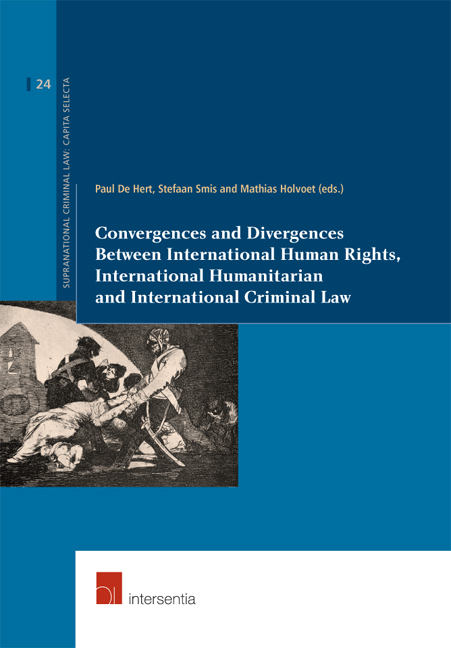Book contents
- Frontmatter
- Foreword
- Preface
- Contents
- About the Contributors
- Part I Convergences and Divergences between International Human Rights Law and International Criminal Law Stricto Sensu
- Part II Convergences and Divergences between International Human Rights Law and Transnational Criminal Law
- Strengthening Action to End Forced Labour: The Ilo Forced Labour Protocol and States’ Positive Human Rights Obligations
- The International Law of Human Trafficking: At the Forefront of the Convergence between Transnational Criminal Law and International Human Rights Law?
- International Security and Financial Stability: Resolving Norm Conflicts between Anti-corruption and Individual Rights
- Part III Convergences and Divergences between International Human Rights Law and International Humanitarian Law
- Conclusion
- Index
- About the Editors
The International Law of Human Trafficking: At the Forefront of the Convergence between Transnational Criminal Law and International Human Rights Law?
from Part II - Convergences and Divergences between International Human Rights Law and Transnational Criminal Law
Published online by Cambridge University Press: 11 October 2018
- Frontmatter
- Foreword
- Preface
- Contents
- About the Contributors
- Part I Convergences and Divergences between International Human Rights Law and International Criminal Law Stricto Sensu
- Part II Convergences and Divergences between International Human Rights Law and Transnational Criminal Law
- Strengthening Action to End Forced Labour: The Ilo Forced Labour Protocol and States’ Positive Human Rights Obligations
- The International Law of Human Trafficking: At the Forefront of the Convergence between Transnational Criminal Law and International Human Rights Law?
- International Security and Financial Stability: Resolving Norm Conflicts between Anti-corruption and Individual Rights
- Part III Convergences and Divergences between International Human Rights Law and International Humanitarian Law
- Conclusion
- Index
- About the Editors
Summary
INTRODUCTION
Is human trafficking foremost a heinous crime, requiring concerted action against organised criminal networks? Or is it primarily a grave human rights violation, in which the protection of victims must be the utmost priority? Human trafficking is about one person appropriating the labour, freedom and dignity of another person. It is about slavery, forced labour, debt bondage, forced marriage, organ removal and the commercial sexual exploitation of mostly women and children. Traditionally, human trafficking activities have been exclusively categorised as crimes and tackled with law enforcement strategies focused on criminalisation and punishment. Now that agreement seems to have been reached that trafficking is also a human rights issue and that a certain degree of complementarity between a criminal and a human rights law approach is utterly needed, important divergences persist on the degree of convergence required and on whether and how this complementarity should be translated into clear and coherent international law commitments. In the meantime, trafficking continues to flourish as a low-risk, high-profit activity for criminals, where millions of women, men and children continue to be exploited all around the word.
Human trafficking lies at the intersection of international human rights law (IHRL) and transnational criminal law (TCL). It is certainly a criminal activity, often perpetrated by transnational organised groups and involving the illegal crossing of borders and the use of violence and corruption to carry out illegal activities. A criminal justice or ‘law and order’ response is undoubtedly required. From the international law perspective, criminal justice matters are dealt with by TCL, which promotes ‘the indirect suppression by international law, through domestic penal law, of criminal activities that have actual or potential trans-boundaries effects’. As opposed to international criminal law (ICL) strictosensu, where the penal proscription is international, the so-called crime control conventions, the typical TCL instrument, establish ‘prohibition regimes’ which are to be implemented at national level, mainly through adapting national criminal law in order to ‘minimize or eliminate the potential havens from which certain crimes can be committed and to which criminals can flee to escape prosecution and punishment’.
But human trafficking is also a human rights issue – a severe and multifaceted one in which various human rights violations occur at different stages of the trafficking cycle.
- Type
- Chapter
- Information
- Convergences and Divergences Between International Human Rights, International Humanitarian and International Criminal Law , pp. 101 - 132Publisher: IntersentiaPrint publication year: 2018



